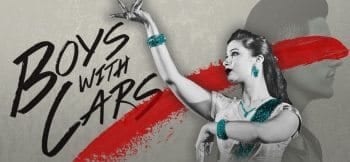Anita Majumdar Addresses Gender Equality In Her Latest Play ‘Boys With Cars’
Mar 27, 2017

Embodying equal rights, Anita Majumdar take a closer look at Generation Z’s unchecked male privilege in her latest play.
Anita Majumdar has a powerful spark as a performer, so it is only appropriate that she is the writer, choreographer and sole performer in Boys With Cars — a coming-of-age show that recounts the challenges, prejudices and turmoils of Indo-Canadian high school student, Naz, in relation to the tapestry of animated peers that surround her.
This show has been adapted for new audiences by Toronto’s Young People’s Theatre, combining two of the three plays that make up Majumdar’s already acclaimed Fish Eyes Trilogy. The intent is to have the current younger generation think about male privilege, inequities among peers, cultural appropriation and sexual consent.

“From the outside it would look like my process is exactly the same, but from the inside it definitely feels different,” Majumdar explains about portraying these characters today, opposed to how she did two years ago. She cites the two biggest influences in this shift as getting married and beginning her master’s degree in theatre, leading to her maturing as a woman and as an artist through more seasoned improvisation skills.
“I wrote a lot of these characters when I was of that age, but I am no longer of that age,” Mujumdar explains, so she now looks externally to younger women in her life, like her sister-in-law, as an embodiment of navigating these issues today.
There is no doubt that Majumdar’s training as a classical Indian dancer plays a vital role in the storytelling, as both lead female characters Naz, and her Caucasian rival and schoolmate, Candice, both express themselves through Indian dance offerings.
While classically trained Indian dancer Naz complains of repeatedly performing mainstream hits like Jai Ho at Caucasian weddings and being stared at, Candice is enamoured with the desire of moving to England and enrolling in the Coventry School of Bhangra and welcomes the attention of being in the spotlight.
In fact, it is Naz’s boyfriend, Lucky Punjabi who seems to attract Candice to want to take Bhangra training through his own pursuit to be the next Bhangra star and auditioning for Bhangra Idol in Calgary. Things quickly become complicated amongst this circle of high school teens in Port Moody, British Columbia (where Majumdar was also born and raised).
While Candice feels attracted to Lucky, her boyfriend Buddy begins to take an interest in Naz at a school assembly when he is sitting next to her. Lucky is away auditioning, so Buddy takes advantage of the situation and coerces Naz into performing a non-consensual sexual act on him, leaving Naz deeply traumatized and ashamed.
However beyond the act of violation, Naz is then faced with Buddy spreading rumours that it was in fact Naz that made the advance on him. Quickly the audience is led to see just how dangerous prejudice, sexism and the subversion of female sexual victimization can be, and the heavy burden that Naz now has on her shoulders. There is constant heckling from her peers and the blaming of tempting Buddy from even her so-called caregiver at home.

At this point the Boys With Cars takes on a much heavier feel and the movements made seem to have a certain melancholy to their tone. Naz is left feeling isolated, anxious and disenfranchised from her peers.
In the second half of Boys With Cars, Majumdar literally embodies the character of Candice, by physically transforming before the onlookers eyes by putting on blue contacts, a blonde wig and applying makeup to her face to appear Caucasian.
“The issue of Black-face really strikes a nerve with me and we have the composite and parallel of Brown-face. We have seen many actors and performers put on Brown-face and imitate what it is to be a person of colour.”
There is no doubt that while it is humourous to see this transformation before our eyes, the poignant social commentary and advocacy Majumdar is expressing in Boys With Cars is about the pressure on women of colour to appear white, and therefore have greater access to attaining privileges in everyday life.
Catch Boys With Cars runs on Young People’s Theatre’s Mainstage from March 23 to April 1, 2017. Visit youngpeopletheatre.ca or call 416-862-2222 for more information and to purchase tickets.
Main Image Photo Credit: Young People’s Theatre














































































































